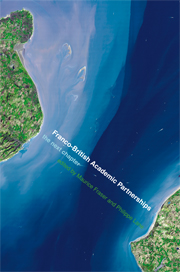Book contents
- Frontmatter
- Contents
- Notes on Contributors
- Foreword by His Excellency Bernard Emié
- Foreword by Sir Peter Westmacott
- Preface
- Part I Teaching and Training Partnerships
- Part II Research Partnerships
- Part III Broader Perspectives
- 20 Faire Mieux Ensemble: A New Approach to Franco-British Research Collaboration for Growth and Employment
- 21 Internationalising Higher Education: The Role of the British Council
- 22 CampusFrance, the French Agency Dedicated to International Mobility in Higher Education and Research
- 23 The Role of the UK Media in the Communications Strategies of France's Grande École Business Schools
- 24 The Franco-British Connections: A Student/Alumni Network Supporting Franco-British Student Initiatives
- 25 A Golden Triangle: Universities, Research and Business. A Comparative Perspective Between the UK and France
- Appendices: Addresses and Speeches at the Franco-British Academic Partnerships Seminar, French Institute, London, 5 February 2010
- Index
21 - Internationalising Higher Education: The Role of the British Council
from Part III - Broader Perspectives
- Frontmatter
- Contents
- Notes on Contributors
- Foreword by His Excellency Bernard Emié
- Foreword by Sir Peter Westmacott
- Preface
- Part I Teaching and Training Partnerships
- Part II Research Partnerships
- Part III Broader Perspectives
- 20 Faire Mieux Ensemble: A New Approach to Franco-British Research Collaboration for Growth and Employment
- 21 Internationalising Higher Education: The Role of the British Council
- 22 CampusFrance, the French Agency Dedicated to International Mobility in Higher Education and Research
- 23 The Role of the UK Media in the Communications Strategies of France's Grande École Business Schools
- 24 The Franco-British Connections: A Student/Alumni Network Supporting Franco-British Student Initiatives
- 25 A Golden Triangle: Universities, Research and Business. A Comparative Perspective Between the UK and France
- Appendices: Addresses and Speeches at the Franco-British Academic Partnerships Seminar, French Institute, London, 5 February 2010
- Index
Summary
Introduction
As city and nation states battle to emerge from world recession, keen to define their position in a new global economic order, higher education is under huge pressure from world governments to drive economic growth and play a key role in securing their global position. As global markets develop rapidly, governments perceive that innovation and economic growth will be generated from global networks of researchers, students and institutions. The question is not whether a country wishes to internationalise its higher education system, but how can it do so for the greatest benefit and most efficiently.
The internationalisation of higher education creates impact at international, national and local levels. International education is a significant industry for the UK (the higher education sector generated £33 billion in 2009, with £5.6 billion from international students), with international research, mobility and teaching partnerships contributing significantly to the total revenue. However, these are hugely dependent on mutual understanding and trust for their success and sustainability. Events of the past decade and predictions of the challenges ahead show us that cultural relations are increasingly important. We are also witnessing a new age of cultural relations beyond the UK, with similar new initiatives emerging in the USA and France.
The pace of change is no longer being set by the traditional leaders of the higher education debate – in the USA, western Europe and Australia. The connections and interdependencies are shaping a future where no single country can lead or dictate the terms of the debate on the future of education.
- Type
- Chapter
- Information
- Franco-British Academic PartnershipsThe Next Chapter, pp. 166 - 176Publisher: Liverpool University PressPrint publication year: 2011



